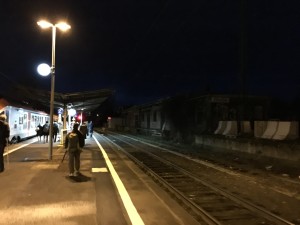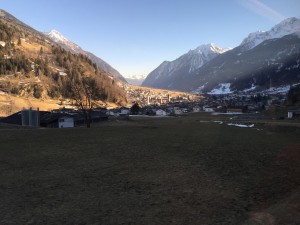I landed in Frankfurt International Airport on January 2nd, and was glad to see that the signs were bilingual. My professors however, were bilingual as well, and had already started the German lessons. This was my first time in the European Mainland, and so far I was liking it. The language barrier was soon present as I arrived in Mainz, where I would be spending my time abroad.
The weekend after New Year’s is a country wide holiday, so I could not move into my dorm/apartment right away. I stayed with Tristan, the other student I was abroad with, and slept on a mattress we acquired from the Housing Department.
The first picture that I took abroad, was a sunrise over the southern part of the city. I hoped that everyday in Germany would be like this, but knew that Germany was no Tuscaloosa.
My favorite thing about Germany was the food, the bread, and public transportation. I never had to drive the entire three months I was there. I could grab groceries on the way back to my apartment, and not have to make a separate trip. The other great thing was everything was so close. I could be in 3 different countries, all within 4 hours. 4 hours to Paris, 4 hours to the Netherlands, and if I wanted to fly, 4 hours to Cairo. I made it to Chur, Salzburg, Tirano, and Wiesbaden, but my courses did not leave much room for traveling as I would have liked.
Salzburg, Austria, The Alps viewed from the Hohensalzburg Castle
Taking classes while abroad was a very different experience than traditional classes. It was only one other student, and myself with our professor. A typical day was about 7-8 hours in the lab or studying, followed by 1-3 hours in class. Then I would go home and do homework or workout and then do it all again the next day. This may seem like a lot of work, however Germany is actually one of the countries that works the least. I’m not kidding.

Taking a train somewhere between Austria and Germany.
The average annual hours worked per person in Germany is 1,330 hours, which is only 25.6 hours per week. A 25 hour work week, now wouldn’t THAT be amazing. These kinds of weeks are inevitable when all of the stores except for groceries close at 7pm. If you want to go shopping for shoes on a Tuesday, you had better take some time off of work to do that.
Germans are very efficient, and their time off is spent in the same way. The locals that I met enjoyed rock climbing, paint balling, bowling, espresso bars, and of course, pubs. The pub and bar scene in Germany is quite different than the States. Sometimes the locals would go drinking on a weekday night, and if you only work about 30 hours a week that’s not a big deal!
Going out on excursions in the city did take some time to get used to. The most difficult thing was everything in Germany was written in German. And that makes sense because their national language, after all, is German. However, most people know English. That does NOT mean that they will speak English. A few people that I met in the city, usually clerks or cashiers, would understand what I was saying in English, but respond or refuse to speak English. I found this difficult at first because I did not know any German before I arrived in Germany, however I made it a goal to not rely on English.
As I was purchasing souvenirs for my roommates back home, I had an entire 10 minute conversation in German about Cuban Cigars at the Cigar store. The clerk was telling me that you could buy them and take them back, but she wasn’t sure if it was completely legal or not. I asked about the new regulations that Obama passed in January, allowing no more than $400 in Cuban goods brought to America, but she hadn’t heard of it.
Pictures of the Alps on the train between Tirano, Italy and Chur, Switzerland.
After I left the store I realized that I was just in a store, in another country, speaking a non-native language to a native about a product that I wished to buy. In three brief months I had learned enough German to understand and converse with a native. To say I was impressed was an understatement.
As I prepared to leave, I was a little frustrated. I had finally just mastered enough of the language to understand the culture and the people that spoke it. I had no problems speaking to locals, and I could go anywhere that I wanted and understand enough to enjoy myself.
It was nice to be going home, but I was torn. I had made friends in Germany that I would surely miss as I went back to the States. I also wasn’t looking forward to the separation from the rich, tough German bread. I was excited to go home and see my family, my dogs, my girlfriend, and my friends back in Tuscaloosa and at home.
I packed up my room, bought my neighbors coffee in exchange for the use of a vacuum, packed up and then was off to the airport.





